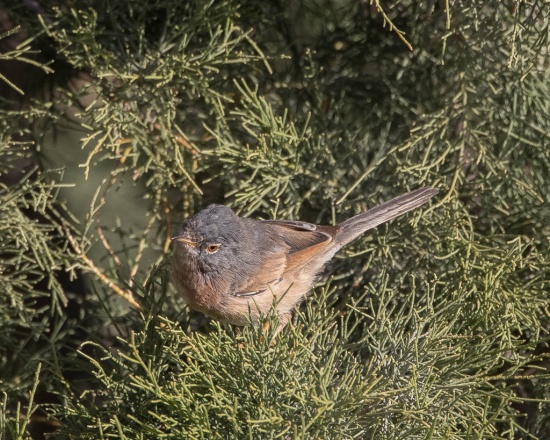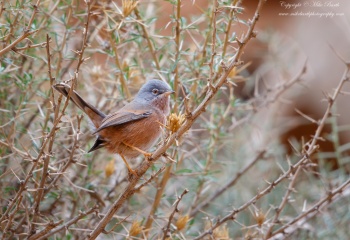m (Picture size and placement) |
(update link) |
||
| Line 13: | Line 13: | ||
*Pale eye-ring | *Pale eye-ring | ||
====Similar Species==== | ====Similar Species==== | ||
| − | [[Dartford Warbler]], [[Spectacled Warbler]] and [[Subalpine Warbler]] | + | [[Dartford Warbler]], [[Spectacled Warbler]], [[Western Subalpine Warbler]], and [[Eastern Subalpine Warbler]] |
==Distribution== | ==Distribution== | ||
Endemic to Northern [[Africa]]: found in [[Morocco]], [[Algeria]], [[Tunisia]], [[Libya]] and possibly [[Mauritania]]. | Endemic to Northern [[Africa]]: found in [[Morocco]], [[Algeria]], [[Tunisia]], [[Libya]] and possibly [[Mauritania]]. | ||
Revision as of 00:26, 2 August 2022
- Sylvia deserticola
Curruca deserticola
Identification
12 cm (4¾ in)
Male
- Bluish-grey head, upperparts and upper wing-coverts
- Pale eye
- Reddish-brown underparts
- Black-tipped yellowish bill
- Pale eye-ring
Similar Species
Dartford Warbler, Spectacled Warbler, Western Subalpine Warbler, and Eastern Subalpine Warbler
Distribution
Endemic to Northern Africa: found in Morocco, Algeria, Tunisia, Libya and possibly Mauritania.
Taxonomy
Subspecies
There are 2 subspecies[1]:
- S. d. maroccana:
- S. d. deserticola:
- Algeria (Atlas Saharien and Aurès ) and adjacent Tunisia
Habitat
Breeds in dry scrub, bare mountain slopes and heaths with scattered trees. Occurs at heights between 1000–2500 m.
Behaviour
The have a long tail, often held erect.
Diet
Their diet consists mostly of small arthropods, such as caterpillars, worms, ants and beetles.
References
- Clements, J. F., T. S. Schulenberg, M. J. Iliff, D. Roberson, T. A. Fredericks, B. L. Sullivan, and C. L. Wood. 2017. The eBird/Clements checklist of birds of the world: v2017, with updates to August 2017. Downloaded from http://www.birds.cornell.edu/clementschecklist/download/
- Avibase
- Handbook of the Birds of the World Alive (retrieved Oct 2017)
- Collins Bird Guide app
Recommended Citation
- BirdForum Opus contributors. (2024) Tristram's Warbler. In: BirdForum, the forum for wild birds and birding. Retrieved 9 May 2024 from https://www.birdforum.net/opus/Tristram%27s_Warbler





